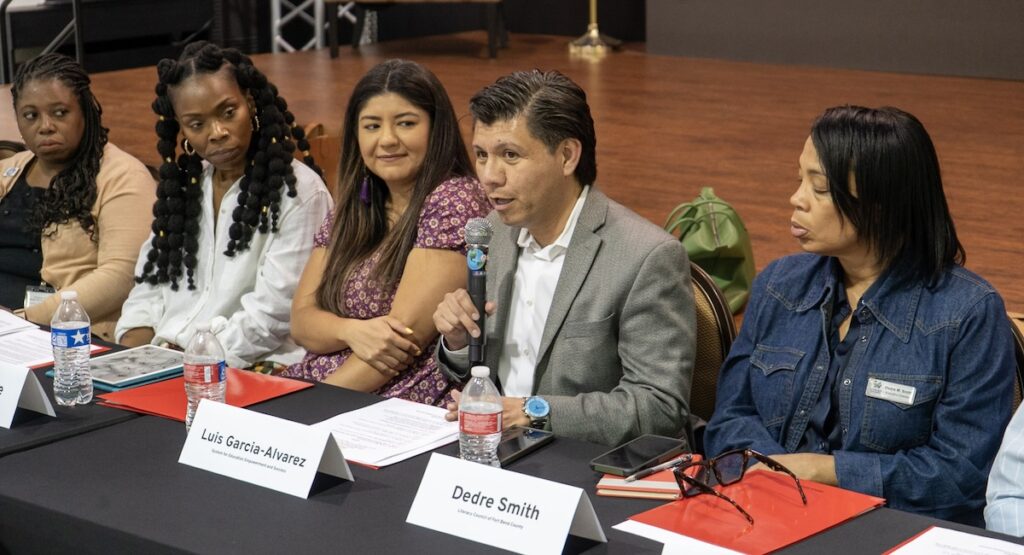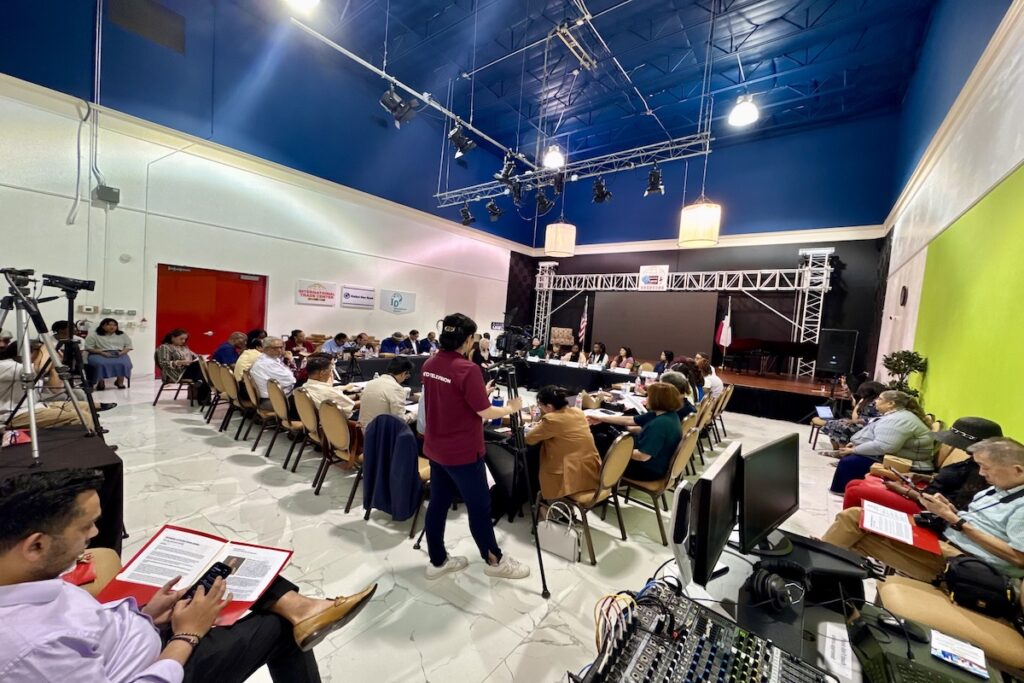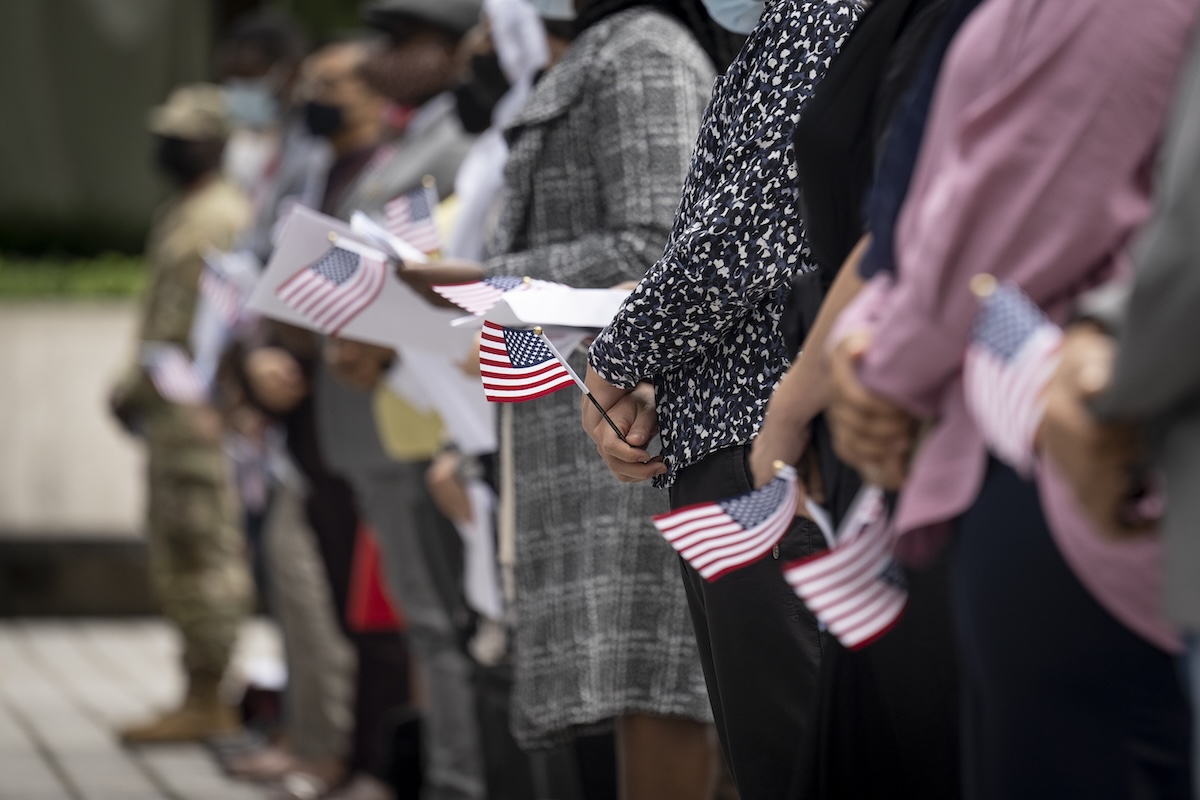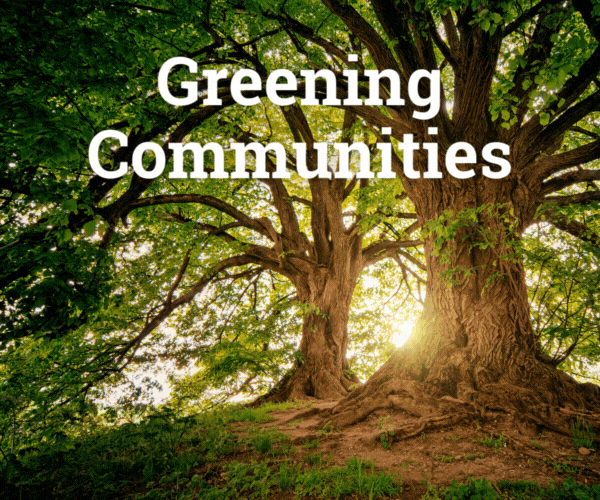HOUSTON – Immigrants, advocates, and legal experts from across Greater Houston gathered recently to share stories of courage, frustration, and determination. Their message to the city’s eligible permanent residents: your green card is not the finish line, citizenship is.
The May 8 event, hosted by Houston Community Media, aimed to break down the barriers that keep the city’s more than 360,000 eligible residents from becoming full U.S. citizens—and to offer support for those ready to take that final step.
“This isn’t new work, but we’ve aligned around promising approaches,” said Dalberg Design Community Collaboration Lead KaNeesha Allen in opening remarks. “Ninety-four percent of those eligible to naturalize in Greater Houston live in Harris, Fort Bend, and Montgomery counties. Nearly 80 percent have lived in the U.S. for more than 10 years—40 percent for over 20.”
Multiple agencies are collaborating for a joint effort to provide community-centered, culturally responsive guidance for applicants.
“Through our partnerships, we are hoping to support hundreds of eligible individuals in the next six months,” Allen said, naming BPSOS Houston, System for Education Empowerment Success (SEDES), and the Literacy Council of Fort Bend as a few key partners.
Naturalization Program Manager for Harris County, Austra Zapata shared her own immigrant story, having arrived from Honduras at age 10 and naturalizing at 15.
“Citizenship is not easy—it’s the trophy at the end of a very long and complicated journey,” she said. “But we’ve built a wraparound program that truly serves Harris County residents at no cost to them.”
According to Zapata, in the first quarter of 2025 alone, Harris County and its nonprofit legal partners provided over 2,000 screenings and 1,400 full legal representations—all free of charge.
“We want people to have access to English classes, immigration attorneys, and culturally trusted community events,” she said.

Reducing obstacles to citizenship
For Zenobia Lai, executive director of the Houston Immigration Legal Services Collaborative, language—and language justice—matter deeply.
“I don’t use the word ‘naturalization’—it reinforces the idea that immigrants are alien or other,” she said. “We’re not alien, we’re human.”
Lai described Houston’s immigration support landscape as an interconnected web of services: “We call it an ecosystem of serving organizations in the Houston area—half of them are service providers and also law school immigration technical programs. The others are partners who provide social services, healthcare, advocacy, and organizing for immigrants in Greater Houston.”
Lai also addressed a major barrier: the $760 application fee.
“Most people don’t have that sitting around,” she said.
Through the “Give Citizenship a Boost” initiative, local organizations are offering financial aid to qualified applicants who fall through the cracks of federal fee waivers.
“It’s about reducing the real obstacles that delay this decision for years,” Lai said.
Peer based outreach

The event comes as the Trump Administration pursues its increasingly harsh deportation campaign, targeting unauthorized migrants and, in some cases, legal permanent residents. There are an estimated 12.8 million green card holders in the U.S., according to Homeland Security data. Many say they fear the naturalization process could expose them to deportation proceedings.
“Under this administration, a denial isn’t just a no—it could lead to deportation. Legal review is essential,” said Lai, adding, “we are extra careful in helping people apply for citizenship because of denials in the past.”
Representing the National Partnership for New Americans, Citizenship Coordinator Angie Dupree emphasized peer-based outreach.
“Many of our navigators have gone through the process themselves,” she said. “They go to churches, schools, grocery stores—to say, ‘You can do this too.’” Dupree also noted that many residents are unaware they may be exempt from the English requirement based on age and residency duration. “That’s often the moment when someone finally feels like, ‘OK, I can do this,’” she said.
Luis Garcia-Alvarez, president and CEO of SEES, reflected on his own delayed journey to citizenship after immigrating to Houston 20 years ago.
“I had the fortune of being a permanent resident, but it took me years to decide to become a citizen,” he said. “Many hesitate—not because they don’t want it, but because they feel like they’re betraying their country of origin or just aren’t ready.”
His organization now offers Citizenship Circles, five-session workshops that walk participants “from A to Z” in preparing for the interview and application.
At WooriJuntos (an amalgam of the Korean words “we” and Spanish “together”), Alice Min described how her team meets clients—many of whom are older Korean or Latino immigrants—where they are.
“Some are non-literate in any language. We build confidence through real understanding, not memorization,” Min said. “We provide civics classes, mock interviews, and even arrange transportation to USCIS interviews. That kind of wraparound care makes all the difference.”
She also shared that her own mother recently became a U.S. citizen through the same process.
“Now she is very independent and very thrilled to engage with civic engagement, voting, and to share her voice as a U.S. citizen,” Min said.
Fear and misinformation
Jannette Diep, executive director of Boat People SOS Houston, reminded attendees that many immigrants are confronting mounting fear and misinformation. “People don’t realize that the green card isn’t the final step—citizenship is,” she said. “Some of our clients have paid thousands to fraudulent attorneys. They didn’t even know free help existed.”
Dedre Smith of the Literacy Council of Fort Bend shared her organization’s evolving role after nearly 40 years of ESL education.
“We graduated 13 U.S. citizens last year, and it brings me joy when they come in and say, ‘I passed the exam!’ even when they were nervous and afraid during mock trials,” she said. “We never turn anyone away. Our job is to be a connector—a lifeline.”
During the Q&A, Erin Slaughter, a Texas Southern University journalism student, raised the issue of mental health as another common barrier to citizenship. In response, Min explained that anxiety and fear are real obstacles: “Many older clients feel overwhelmed or anxious. That’s why we prioritize confidence-building alongside civics education.”
Zapata added, “Our social services coordinator connects people to support services during intake—whether that’s mental health, transportation, or other needs. We want them to feel safe the whole way through.”
Closing out the event, resident and member of a local citizens advisory council Michael Treviño called for urgency. “This is not the time to be a bystander. Be an upstander,” he said. “People are paying taxes, working in our hospitals, contributing to our communities. They deserve to be recognized.”
More information and helpful resources on citizenship and naturalization can be accessed through the following websites: Become a Citizen Today, Naturalize Houston, and the U.S. Citizenship Guide.
Feature image via Rawpixel





